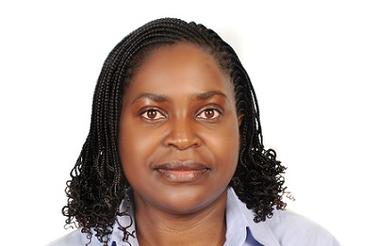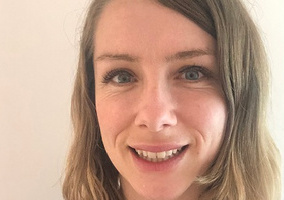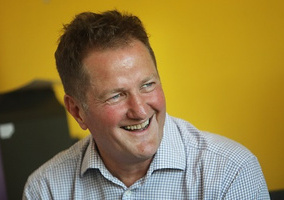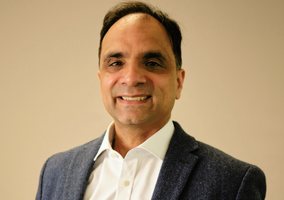In 2020, Chance for Childhood (CfC), a charity that supports children in five east and west African countries and Sri Lanka, embarked on a journey to “shift the power”.
CfC said the move meant unpicking the decisions that it makes on behalf of its partners and beneficiaries, “that they should have the power to make themselves”.
As part of this work, the charity reformed its senior management team (SMT) to ensure better representation of its leadership roles in the African countries where it operates. Its country representatives in Ghana, Rwanda and Uganda joined its UK-based SMT to form a new global leadership team.
It was also in 2020 that CfC began to nurture the idea of appointing an Africa-based chief executive to be “truly authentic”.
Rwanda-based Ven Nyamondo, who joined the charity in 2018, says she was “sceptical” when she first heard about this intention.
“At that time, I didn’t believe that to be sincere,” she says.
“In five years, our strategy said we were supposed to have an Africa-based CEO. When I saw it, I went like: ‘Oh, okay, good intentions. Let’s see how this goes.’ Every one of the five agenda items was unpacked and implemented, but the CEO part was the one I never understood. ‘How will this ever happen or work?’ I thought it was a nice to have in a document which the organisation was passionate about.”
However, CfC was true to its words. In October 2024, Anna-mai Andrews internally shared her decision to step down as the charity’s long-standing CEO to allow an Africa-based CEO to come in, and officially stood down in February 2025.
In May, Nyamondo stepped up as acting CEO of CfC before being appointed as permanent CEO in September.
Eyes and ears on the ground
Nyamondo is a certified public accountant, who began her career as an auditor.
In 2006, she joined the Adventist Development and Relief Agency (ADRA) – the global humanitarian arm of the Seventh-day Adventist Church – as an accountant.
After spending over a decade at ADRA, she joined CfC as regional finance manager and was later promoted to the role of chief operating officer.
She says stepping up to the role of CEO meant going from being part of CfC’s strategic management team to leading it, which can sometimes be challenging.
“The reality is that I sometimes have to step away from the team and say: ‘No.’ I have to create a vision and give a direction. As much as I’m one among you, the shots have to be called. The buck stops with me. That’s been my number one reality check and realisation. It feels sad to some extent and lonely, but that’s what it is.”
For Nyamondo, this role is more than just a leadership transition. Being based where the charity operates means being closer to its programmes and able to make quicker decisions.
“Now that I’m based near the programmes and communities – and that’s not to say a UK-based CEO can’t make these sorts of decisions – there’s the agility of being around, moving and checking any situations. Being on the continent means that you’re close, can go check it out and give a candid response on the matters.”
She cites CfC’s programmes in the Democratic Republic of Congo (DRC), where a conflict has been ongoing for over 30 years and the charity invested £104,000 in its work there in 2024-25, reaching 774 children directly.
“Our programmes there are still running and people are trying their best,” Nyamondo says.
“Our classrooms have turned into refugee camps at night, where people come and sleep, and welcome students during the day.
“Someone who sits in London might not appreciate that as much because it’s not in front of them. We’re creatures of sight, touch and feel. Our senses speak a lot more and tell us things differently, as opposed to when you read something in a paper. The proximity and speed of responsiveness have been big advantages.”
Nyamondo says one of the positive things that came out of the pandemic is the accelerated shift to remote working.
“Covid-19 has changed us in the last five years in terms of how we work. Yes, there are a few challenges here and there, but the biggest advantages have been the proximity to the programmes and agility to be decisive, show up and make decisions fast.
“Our trustees rely on me: ‘Ven, you’re our eyes and ears on the ground. What are they saying about DRC? Is it true?’ Having knowledge and experience about the region, all those things work in favour of our operations, programmes and human resources.
“Having said that, that’s not to discredit someone who’s in the UK. It can be done and has been for many years.”
Decentralising power from the UK
Appointing an Africa-based CEO is not the only decision CfC has taken as part of its journey to decentralise power from the UK.
While the charity’s headquarters has been in the UK since 1992, its programmes are now run by country teams across Africa, with each staff member there being an African national.
In addition, 60% of CfC’s senior leadership team are now African nationals, while half of its global trustees either originate from or have lived and worked in the countries where it operates.
In August, the charity relaunched its #OverExposed campaign, which urges the development sector to rethink its approach to storytelling.
The campaign was first launched in 2022 as a way to start a conversation about how the sector uses images and tells stories.
As such, the charity decided to remove identifiable features of children under 18 from all of its communications, as they might not be able to give their consent or understand.
Asked why CfC relaunched this campaign this year, Nyamondo says dignifying humans “never ceased to be an important agenda”.
“We’re saying: ‘Why can’t we accord human beings the dignity of wanting their stories told in the best way possible, so that when they look at it down the line, they’re not embarrassed?’
“There are a lot more disasters, stress and need for humanitarian and development work.
“The urgency is greater now than when we launched the campaign. We’re living in a time of crisis. Therefore, it’s more urgent for us to go out there and say: ‘Accord human beings the dignity they deserve. I don’t want you to present me at my weakest because I believe that I won’t always be like that.’”
A more collaborative approach
When Nyamondo joined the not-for-profit and development sectors nearly 20 years ago, she says operations were mostly driven by a “north-south agenda”, with those in the north designing and implementing programmes based on their perception of the south.
“But over the years, the story has changed to say: ‘Why don’t we ask them what they think their challenge is, and complement or come in to provide support and assistance?’” she says.
“Now, what I see is a more collaborative approach in programme design, so it’s not a north-to-south agenda, but more: ‘This is what I can bring to the table as your potential supporter. You tell me what your challenge is, and then we can see how we can work together.’”
Another major change is the impact of challenges in the political landscape, which she says are interfering with international development and increasing polarisation.
“What was purely international development is completely affected by politics now.
“Geopolitics has brought too much influence into what we were massively perceiving, naively, as development, but there was always a political agenda from whoever was bringing in the investment or funds.”
She is also seeing “a lot more stress in terms of the funding”, with some people saying: “Why would we be taking the funding out to develop someone’s corner when we have our own challenges at home?”
Plans to double income
Nyamondo says that there is never “a good or bad time to come into a role of leadership”, especially given that nearly every year in recent years has been marked by a crisis.
“In 2019, there was a global pandemic,” she says. “Since 2022, there’s been a war on European soil. We hit 2025, and the US Agency for International Development crashed. There’s never an easy time to come into leadership.”
As part of its new 2025-30 strategy, which is being finalised, CfC will pledge to double its income and reach up to 200,000 children.
To do so, Nyamondo says her charity must innovate and pursue more long-term programmes, as opposed to short, one-year cycles.
“In the prior strategy, our goal was to reach 150,000 children, and we surpassed that by 24% in three years. Our income also doubled. There are a lot of mathematics, extrapolation and thinking, but also an intent to invest in people and capabilities so that we can reach our targets.
“We’ll invest in people who can help us grow the portfolios – we have a plan on how we’ll hit those targets. Are the environment and sector difficult? Yes, but we have new ways to get funding.”
She gives the example of payment by results, a form of financing that makes payment contingent on the outcomes.
While she does not believe it is a popular way of implementing development projects, she says, “it’s now seen as a better way of introducing some business sense for you to be more accountable and earn whatever it is that you’re doing”.
“In three years, we were able to double our income. What makes us think we can’t double our income in five years? How hard will it be? We did that through Covid-19 – we had £800,000 and now we’re at £1.8m, so I believe it can be done.”













